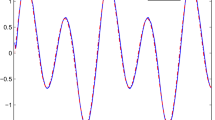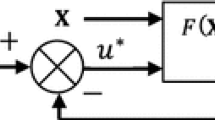Abstract
A direct adaptive fuzzy control algorithm is developed for a class of uncertain SISO nonlinear systems. In this algorithm, it doesn’t require to assume that the system states are measurable. Therefore, it is needed to design an observer to estimate the system states. Compared with the numerous alternative approaches with respect to the observer design, the main advantage of the developed algorithm is that on-line computation burden is alleviated. It is proven that the developed algorithm can guarantee that all the signals in the closed-loop system are uniformly ultimately bounded and the tracking error converges to a small neighborhood around zero. The simulation examples validate the feasibility of the developed algorithm.
Similar content being viewed by others
References
Z. P. Jiang, “Advanced feedback control of the chaotic Duffing equation,” IEEE Trans. on Circuits and Systems I: Fundamental Theory and Applications, vol. 49, no. 2, pp. 244–249, 2002.
C. C. Hua and X. P. Guan, “Adaptive control for chaotic systems,” Chaos, Solitons & Fractals, vol. 22, no. 1, pp. 55–60, 2004.
D. Huang, “Adaptive feedback control algorithm,” Physical Review E, vol. 73, 066204, 2006.
C. C. Hua, X. P. Guan, and P. Shi, “Adaptive feedback control for a class of chaotic systems,” Chaos, Solitons & Fractals, vol. 23, no. 3, pp. 757–765, 2005.
Y. S. Liu and X. Y. Li, “Decentralized robust adaptive control of nonlinear systems with unmodeled dynamics,” IEEE Trans. on Automatic Control, vol. 47,no. 5, pp. 848–856, 2002.
L. X. Wang, “Fuzzy systems are universal approximators,” Proc. of IEEE International Conference on Fuzzy Systems, San Diego, 1992: 1163–1170.
L. X. Wang, “Stable adaptive fuzzy control of nonlinear systems,” IEEE Trans. on Fuzzy Systems, vol. 1, no. 2, pp. 146–155, 1993.
B. S. Chen, C. H. Lee, and Y. C. Chang, “H∞ tracking design of uncertain nonlinear SISO systems adaptive fuzzy approach,” IEEE Trans. on Fuzzy Systems, vol. 4, no. 1, pp. 32–43, 1996.
J. H. Park, S. J. Seo, and G. T. Park, “Robust adaptive fuzzy controller for nonlinear system using estimation of bounds for approximation errors,” Fuzzy Sets and Systems, vol. 133, no. 1, pp. 19–36, 2003.
N. Essounbouli and A. Hamzaoui, “Direct and indirect robust adaptive fuzzy controllers for a class of nonlinear systems,” International Journal of Control, Automation, and Systems, vol. 4, no. 2, pp. 146–154, 2006.
P. A. Phan and T. J. Gale, “Direct adaptive fuzzy control with less restrictions on the control gain,” International Journal of Control, Automation, and Systems, vol. 5, no. 6, pp. 621–629, 2007.
B. Chen, X. P. Liu, and S. C. Tong, “Adaptive fuzzy approach to control unified chaotic systems,” Chaos, Solitons & Fractals, vol. 34, no. 4, pp. 1180–1187, 2007.
G. Besancon, J. Deleon-Morales, and O. Huertaguevara, “On adaptive observers for state affine systems,” International Journal of Control, vol. 79, no. 6, 2006, 581–591.
Q. Zhang and B. Delyon, “A new approach to adaptive observer design for MIMO systems,” Proc. of American Control Conference, pp. 1545–1550, 2001.
Q. Zhang, “Revisiting different adaptive observers through a unified formulation,” Proc. of IEEE Conference on Decision and Control, pp. 3067–3072, 2005.
Y. G. Leu, T. T. Lee, and W. Y. Wang, “Observer-based adaptive fuzzy-neural control for unknown nonlinear dynamical systems,” IEEE Trans. Systems, Man, and Cybernetics-Part B: Cybernetics, vol. 29, no.5, pp. 583–591, 1999.
C. H. Wang, T. C. Lin, T. T. Lee, and H. L. Liu, “Adaptive hybrid intelligent control for uncertain nonlinear dynamical systems,” IEEE Trans. on Systems, Man and Cybernetics-Part B: Cybernetics, vol. 32, no. 5, pp. 583–597, 2002.
W. Y. Wang, Y. G. Leu, and T. T. Lee, “Output-feedback control of nonlinear systems using direct adaptive fuzzy-neural controller,” Fuzzy Sets and Systems, vol. 140, no. 2, pp. 341–358, 2003.
S. C. Tong and H. X. Li, “Direct adaptive fuzzy output tracking control of nonlinear systems,” Fuzzy Sets and Systems, vol. 128, no. 1, pp. 107–115, 2002.
S. C. Tong, H. X. Li, and W. Wang, “Observerbased adaptive fuzzy control for SISO nonlinear systems,” Fuzzy Sets and Systems, vol. 148, no. 3, pp. 355–376, 2004.
T. C. Lin, C. H. Wang, and H. L. Liu, “Observer-based indirect adaptive fuzzy-neural tracking control for nonlinear SISO systems using VSS and H∞ approaches,” Fuzzy Sets and Systems, vol. 143, no. 2, pp. 211–232, 2004.
X. J. Wei and Y. W. Jing, “Robust adaptive fuzzy controller for nonlinear systems based on approximation errors,” Proc. of American Control Conference, Boston, Massachusetts, pp. 459–463, 2004.
C. C. Kung and T. H. Chen, “Observer-based indirect adaptive fuzzy sliding mode control with state variable filters for unknown nonlinear dynamical systems,” Fuzzy Sets and Systems, vol. 155, no. 2, pp. 292–308, 2005.
A. Boulkroune, M. Tadjine, M. M’saad, and M. Farza, “How to design a fuzzy adaptive controller based on observers for uncertain affine nonlinear systems,” Fuzzy Sets and Systems, vol. 159, no. 8, pp. 926–948, 2008.
C. T. Chen, Linear System Theory and Design, 3rd ed., Oxford Univ. Press, London, U.K. 1999.
H. Olsson, K. J. Astrom, C. Canudas, M. Gafvert, and P. Lischinsky, “Friction models and friction compensation,” European Journal of Control, vol. 4 pp. 176–195, 1998.
Author information
Authors and Affiliations
Corresponding author
Additional information
Recommended by Editorial Board member Zhong Li under the direction of Editor Young-Hoon Joo. This work is supported by National Natural Science Foundation of China under grant 60674056, 60874056, and the Foundation of Educational Department of Liaoning Province (2008312).
Yan-Jun Liu received the B.S. degree in Applied Mathematics from Shenyang University of Technology in 2001. He received the M.S. degree in Control Theory and Control Engineering from Shenyang University of Technology in 2004 and the Ph.D. degree in Control Theory and Control Engineering from Dalian University of Technology, China, in 2007. His research interests include fuzzy control theory, nonlinear control and adaptive control.
Shao-Cheng Tong received the B.S. degree in Department of Mathematics from Jinzhou Normal College, China, in 1982. He received the M.S. degree in Department of Mathematics from Dalian Marine University in 1988 and the Ph.D. degree in Control Theory and Control Engineering from Northeastern University, China, in 1997. His research interests include fuzzy control theory, nonlinear control, adaptive control, and system identification etc.
Wei Wang received the B.S. degree in Department of Automation from Northeastern University, China, in 1982. He received the M. S. degree in Department of Automation from Northeastern University in 1984 and the Ph.D. degree in Department of Automation from Northeastern University, China, in 1988. His research interests include adaptive predictive control, intelligent control, and production scheduling method etc.
Yong-Ming Li received the B.S. degree in Applied Mathematics from Liaoning University of Technology in 2004. He received the M.S. degree in Applied Mathematics from Liaoning University of Technology in 2007. His research interests include fuzzy control theory, nonlinear control and adaptive control.
Rights and permissions
About this article
Cite this article
Liu, YJ., Tong, SC., Wang, W. et al. Observer-based direct adaptive fuzzy control of uncertain nonlinear systems and its applications. Int. J. Control Autom. Syst. 7, 681–690 (2009). https://doi.org/10.1007/s12555-009-0420-4
Received:
Accepted:
Published:
Issue Date:
DOI: https://doi.org/10.1007/s12555-009-0420-4




